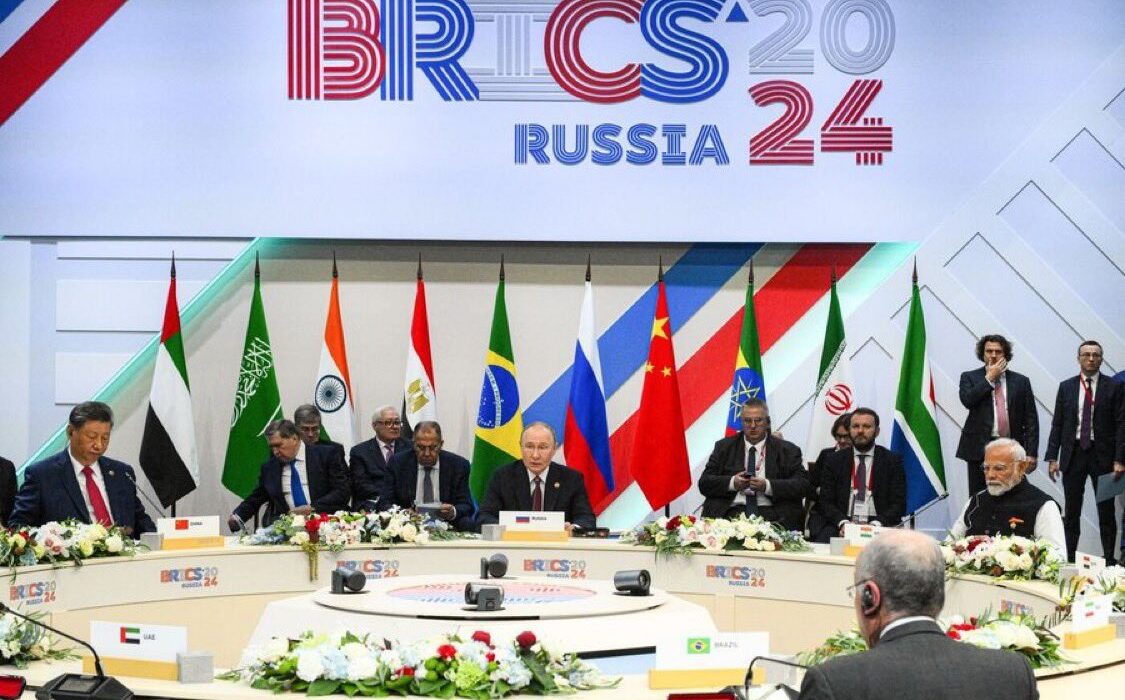The 16th BRICS Summit, held in Kazan, Russia, last week, brought together 36 world leaders who reaffirmed their commitment to reforming the current world order. The summit issued a comprehensive declaration[i] on expanding BRICS’ influence and advancing its collective interests.
Among their concerns, Afghanistan featured prominently. The declaration emphasised “the need for an urgent peace settlement” in the country to achieve a vision of an “independent, united, and peaceful state free from terrorism, war, and drugs.” To facilitate such a settlement, it also highlighted the “primary and effective role of regional platforms and neighbouring countries.”
Despite the Taliban’s ongoing claims and assurances, BRICS called on them to implement “more visible and verifiable” counter-terrorism measures. In alignment with the wider international community, it also urged the Taliban to “safeguard the fundamental rights of all Afghans, including women, girls, and diverse ethnic groups.”
Moreover, in response to the deteriorating humanitarian situation in the country, BRICS urged the international community to provide “urgent and uninterrupted humanitarian assistance.”
Overall, the demand side of the equation is well defined. It reflects the general aspirations of the Afghan people and aligns with the international consensus embodied in United Nations Security Council (UNSC) Resolution 2721 (2023)[ii].
However, BRICS members and partners must confront the challenge of formulating and executing an effective strategy to achieve these goals.
Firstly, none of the regional platforms and initiatives emphasised by BRICS has produced a policy consensus on the content, process, and participants to be involved in the urgently needed peace settlement. This sense of urgency has been notably absent for over three years since the Taliban’s return to power.
Clearly, such a settlement will require agreement among Afghan stakeholders, both Taliban and non-Taliban. Ironically, non-Taliban Afghan actors, whether inside or outside Afghanistan, have not been invited to participate in any of these regional platforms. Moreover, there has yet to be an established roadmap for intra-Afghan negotiations to achieve the settlement.
After decades of disastrous conflicts, it is evident that the foundation for a peaceful Afghanistan—one that is free from terrorism and drugs and does not contribute to one of the world’s largest refugee populations—hinges on the legitimacy of its state system. This legitimacy can only arise from the free will of the Afghan people and a commitment to their fundamental rights and freedoms, regardless of gender, ethnicity, language, or faith. Such an end state will represent the most reliable—and perhaps the only—insurance policy for stakeholders seeking peace, stability, and security in Afghanistan and beyond.
Therefore, it is imperative for the region and the international community to support inclusive intra-Afghan peace negotiations and a settlement that ensures lasting peace and legitimate governance. To achieve this, non-Taliban Afghan stakeholders must unite for this historic mission. The region and the international community should work to empower these stakeholders and end their current political isolation.
Secondly, achieving the goals set by both the UNSC and BRICS critically depends on the unity of purpose and approach between regional and Western powers in engaging, incentivising, or coercing the Taliban. Ignoring historical evidence and undermining the common positions of the international community—particularly regarding international recognition, sanctions, and assistance—will jeopardise shared interests.
No single country can influence the calculus of the current Taliban leadership on its own, nor can any bilateral dealings with the Taliban secure one nation’s interests in isolation. The hard-learned lessons from the conflicts in and over Afghanistan underscore that enduring security for any individual country depends on collective security for all.
In this regard, a notable concern is the BRICS declaration’s omission of a clear commitment to the aforementioned UNSC Resolution and its mandated Doha process under UN leadership. While the UNSC Resolution aligns the shared interests of BRICS and Western powers, the Doha process provides a collaborative framework for realising those goals.
Emphasising the primary role of regional platforms and neighbouring countries is understandable, given the high stakes and considerable influence in Afghanistan of most BRICS members (China, Russia, India, Iran, UAE, and Egypt) and some of its potential members in the region. However, diverging from the international consensus—particularly on a unified approach to normalising relations with the Taliban, contingent upon their full respect for Afghanistan’s international obligations—would be self-defeating. The gravest risk, however, lies in allowing the rivalries and disputes of major powers elsewhere in the world to undermine a coordinated response to Afghanistan’s crises.
Security, political stability, human rights, counter-narcotics, and the prevention of forced and mass population movements are shared interests that can only be realised through common and coordinated efforts. Currently, the most legitimate, inclusive, and potentially viable mechanism for directing international efforts towards the goals outlined in the Resolution and the Declaration, as well as the recommendations from the UN independent assessment by Ambassador Feridun Sinirlioğlu, is the Doha process. Any regional platform or initiative should complement this primary endeavour, as exclusionary approaches risk undermining collective efforts and jeopardising the interests of all stakeholders involved.
However, for the Doha process to maintain its legitimacy and the confidence of stakeholders, it must adhere to the principles and goals delineated by the two bodies mentioned above. It must also ensure the participation not only of the Taliban but also of non-Taliban Afghans in the process. The track record of the Doha process thus far has not inspired much confidence in this regard, and this situation needs to be addressed promptly.
Finally, the claim regarding the primary role of regional and neighbouring countries must be substantiated by increased contributions to humanitarian efforts addressing the deteriorating situation in Afghanistan, where millions of lives are at risk. Such contributions would lend credibility to BRICS’s call for international action.
Unfortunately, according to the United Nations, as of 25 October 2024, only 37.2% of the USD 3 billion funding requirement for the Afghanistan Humanitarian Response Plan 2024 has been secured[iii]. Of the resources provided thus far, 94% has come from Western nations, Japan, Korea, and Australia, while only 2% has been contributed by BRICS nations. Although some direct and in-kind assistance from other BRICS countries may not be reflected in the UN Financial Tracking System, the funding gap and disparity in the level of contributions remain significant.
In conclusion, it is in the self-interest of all stakeholders to ensure that their efforts—in the political, security, human rights, and humanitarian domains—reflect the current consensus and are mutually inclusive and reinforcing, working through a common mechanism to secure Afghanistan’s future as commonly desired.
[i] http://static.kremlin.ru/media/events/files/en/RosOySvLzGaJtmx2wYFv0lN4NSPZploG.pdf
[ii] https://digitallibrary.un.org/record/4032048/files/S_RES_2721_%282023%29-EN.pdf?ln=en
[iii] https://fts.unocha.org/countries/1/summary/2024
Mohammed Haneef Atmar is Afghanistan’s former Foreign Minister.
The views expressed in this article are solely those of the author and do not necessarily reflect those of Amu TV.





